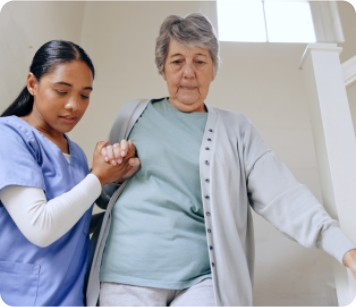
Becoming a personal care assistant, sometimes known as a personal care attendant, is a rewarding career path filled with opportunities to make a real difference in someone’s life. Personal care assistants provide essential help to people with varying degrees of physical illnesses and health-related responsibilities.
This could be within the comfort of their home, nursing homes, residential care facilities or even adult day care centers. If you’re considering this career path and wondering how to become a personal care assistant or how much you can make, read on.
Understanding Personal Care Assistant Jobs
Personal care assistant jobs involve assisting individuals with their physical needs, personal hygiene, and, in some cases, light housekeeping duties. This typically involves working with elderly, disabled or chronically ill individuals who need help with everyday tasks such as bathing, dressing and meal preparation.
Furthermore, personal care assistants may also provide some level of companionship to those in their care, offering conversation and emotional support. They often work in a client’s home but can also work in institutions like residential care facilities. The daily tasks can be physically challenging and emotionally demanding but can also be rewarding.
The Role And Responsibilities of PCA
1. Personal Care
Personal Care Assistants, a key component of the Healthcare Industry, perform a variety of essential tasks. Their role includes everything from helping clients with personal grooming activities such as bathing and dressing to preparing meals—always keeping dietary restrictions in mind – and assisting with medication reminders. Their presence ensures that individual needs are met, making them a pivotal part of personal care.
2. Mobility Assistance
PCAs, working within the scope of daily living and personal care assistance, may often need to assist individuals with mobility issues. This can involve helping them move around the house, aiding them to get in and out of bed, or accompanying them outside for ambulatory exercises, walks, or medical appointments. Their role is critical in ensuring the everyday mobility needs of those they care for are met in a safe and secure manner.
3. Health Monitoring
Another critical role of a PCA’s basic care is monitoring the client’s health by checking vital signs, observing any changes in behavior or health status, and communicating these findings promptly to the health care provider or family.
4. Household Chores
To make the client’s living space comfortable and safe, PCAs often perform light household duties. This may include cleaning, laundry, grocery shopping, and even pet care if necessary.
5. Emotional Support
A critical but often overlooked aspect of a PCA’s job is providing emotional support. By building a strong, trusting relationship with clients, PCAs can provide much-needed companionship to those they care for.
6. Recreational Activities
To improve the client’s quality of life, PCAs can assist with or organize recreational activities. These activities may vary from reading, games, gardening, or even accompanying the client to social gatherings.
7. Medication Management
While PCAs are not typically authorized to administer medication, they can help remind clients when it’s time to take their prescribed medication and report any side effects or concerns to the supervising healthcare professional.
8. Care Plan Execution
PCAs follow a personalized medical care plan that a healthcare professional typically develops. The PCA assists in implementing this care plan and regularly updates it according to changes in the client’s condition or preferences.
9. Communication
A PCA often acts as a liaison between the individual they are caring for and their family, healthcare professionals, or nursing assistants. They communicate important updates, changes, or needs that might require professional medical attention.

What Are the Personal Care Assistant Requirements?
Education
Typically, the minimum education level required is a high school diploma or equivalent. Some states or care facilities, however, may need candidates to have completed certain healthcare-related coursework.
Training
Acquiring the necessary skills to become a personal care assistant often involves basic training. Certain jobs might only demand on-the-job training, but many prospective employers favor those candidates who have undergone formal training. Formal training typically includes understanding basic nutrition, the process of aging, infection control, and providing long-term care.
Once you’ve finished your basic and formal training, make sure to highlight these experiences on your Personal Care Assistant resume.
Certification
If you’re wondering how to become a PCA, some positions may require you to earn a certification. This often involves passing a competency exam, which assesses your ability to provide adequate care and assist with daily activities.
Health Exams
Several states mandate health exams or screenings not only to confirm that the assistant is free of communicable diseases but also to check for any chronic illnesses. These mandatory screenings could impact job prospects for some individuals, especially in sectors requiring direct, frequent interaction with other people.
Regardless of the results, it’s important for all workplaces to adhere to universal precautions to safeguard everyone’s health and wellness.
Background Check
As you will be working closely with individuals who may be vulnerable, companies will typically perform a thorough background check.
Skills
The average personal care assistant needs a variety of technical skills as well as soft skills. They need to be caring, patient, and understanding. Good communication and problem-solving skills are also a must. In some cases, being able to cook or perform household tasks on top of other personal care assistant duties will be requested.
Experience
Gaining relevant experience is a vital step on how to become a personal care assistant. Although it may not always be a prerequisite, some providers show a preference for experience in a related field. This could involve acquiring basic training in direct care, honing caring skills while looking after children, attending to elderly individuals, or assisting those with disabilities.
These experiences in direct care can provide a good foundation on how to become a personal care assistant, as it often relates to handling day-to-day tasks effectively and providing care to patients in a dedicated and compassionate manner.
How Much Does a Personal Care Assistant Make?
The income of a Personal Care Assistant (PCA) can greatly vary and is determined by several factors.
These factors include:
- Education And Training Standards. Although only a high school diploma or equivalent is generally required, further education, training, or certification can increase your value in the job market and, consequently, your potential earnings.
- Experience. Like many other professions, experience plays a substantial role in determining a personal assistant’s salary. Assistants with several years of experience, particularly those who specialize in caring for individuals with specific needs, are likely to earn more than newcomers to the field.
- Size and Setting of the Employer. Personal care assistants who work in large, urban hospitals or long-term care facilities usually receive higher compensation compared to those working in smaller, rural facilities or providing in-home personal care tasks.
- Location. The region or state where you are working can significantly influence your salary. Typically, states with a high cost of living, like New York or California, pay higher wages compared to states with a lower cost of living.
- Specialization. PCAs providing specialized care for patients with severe illnesses and disabilities, or those demanding a higher level of skill or knowledge, tend to make a higher wage.
- Private Clients. Assisting private clients in their own living facilities often leads to higher earnings. Some families choose to hire a PCA privately rather than utilize an agency, and this can result in a higher wage, albeit without the benefits that come with being employed by an agency.
Unlock Your Career In Personal Care Now at AmeriBest Home Care
Being a personal care assistant is undoubtedly a demanding job that requires a good blend of technical and interpersonal skills. However, helping someone maintain their independence and improve their quality of life makes this career incredibly rewarding. No two days are the same in personal care assistant roles, which adds to its appeal for those who strive to make a meaningful difference in the lives of others each day.
The rewarding nature of this job is hard to match. Beyond providing professional support, you eventually become a critical part of someone’s life. The job requires empathy, resilience, and patience, but the personal satisfaction and benefits you receive can be immense.
If you’re considering this career path and are looking for guidance on providing personal care services, we’re here to help. Whether it’s information on PCA job duties, skills, or employment requirements, we can guide you on the right path. Contact us today to schedule an appointment.




